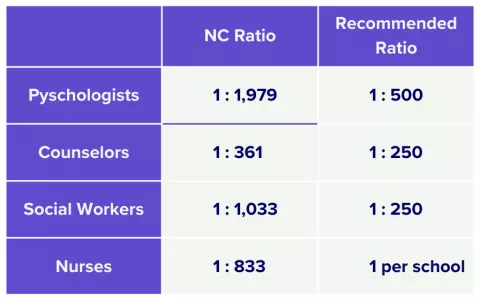Physical and mental health support for students
Student mental health is a growing problem within our young generation. In 2020, the last year complete data is available, 56 children between the ages of 5-17 died by suicide continuing an alarming upward trend over the past decade. The mental health crisis is a threat to our children and their academic success.

Public school educators on the front lines in the battle against the mental health crisis, but they need reinforcements. Teachers want to help all students in need, but that comes at a cost to other children in the classroom. North Carolina continues to lag behind national recommendations in the numbers of school psychologists, counselors, social workers and nurses per student.
An expansion of funding will allow schools to hire additional teacher assistants, school nurses, counselors, social workers, and psychologists to address the many mental and physical challenges our students face while meeting all staffing requirements based on national standards.
Tutoring support for students
The past several years have been tumultuous for our students, educators and communities with disruptions in learning exacerbating many of the factors that cause students to fall behind in academics. In addition to core instruction received during the school day, additional funding should be directed to supplemental academic services in the form of in-school tutoring to help our students catch up to where they need to be to succeed and grow in their academic journeys.
Studies conducted by DPI’s office of Learning Recovery and Acceleration have shown that additional support through tutoring programs can help improve outcomes for students who were most impacted by learning disruption.
Universal breakfast and lunch
One in six North Carolina children go hungry, according to the North Carolina Association of Feeding America Food Banks. Between 2021 and 2022 there was an 11% decrease in the number of students receiving school lunch and a 14% decrease in those receiving school breakfast – directly coinciding with the end of COVID-era federal breakfast and lunch programs.
No-cost school meals can help ensure fewer students go hungry and are an investment in academic success. Studies show that students who participate in school meal programs have improved attendance, behavior, academic performance, and achievement. When kids eat healthy meals they are better able to focus in class.
Our food service professionals are an asset ready to serve entire school communities hot and healthy meals.
Recruitment and retention of quality educators
Enrollment in education programs continues to drop at the same time our state is seeing teachers leaving the profession – particularly among early career educators. According to the newest data from DPI, 11.5% of teachers left their role last school year and public schools are short more than 6,000 educators – with the real number likely higher as classes are covered by long term substitutes and administrators. The most commonly cited reason for educators leaving public schools is for a career change, and while we can’t know for sure the exact reasons, we do know that these educators are likely able to find higher paying jobs in other professions as our state continues to grow.
Studies show that experience matters when it comes to how effective our educators are, and that only happens if educators stay in our public schools. Our state must show that it values experience through a comprehensive and professional reform of educators’ salaries based on education and experience, including annual retiree cost of living adjustments. Restoring full longevity and master’s degree pay for all teachers and school-based administrators will help North Carolina ensure our students have access to the highly qualified educators they deserve.
Rather than recreate a teacher licensure system that prioritizes exams that cannot predict educator effectiveness, North Carolina should focus on increasing the diversity of our education workforce, something we know leads to better outcomes for students. Prioritizing requirements that are better indicators of effectiveness will expand the pool of qualified educators and help address both the lack of diversity in the workforce and increase those educators’ potential for success.
